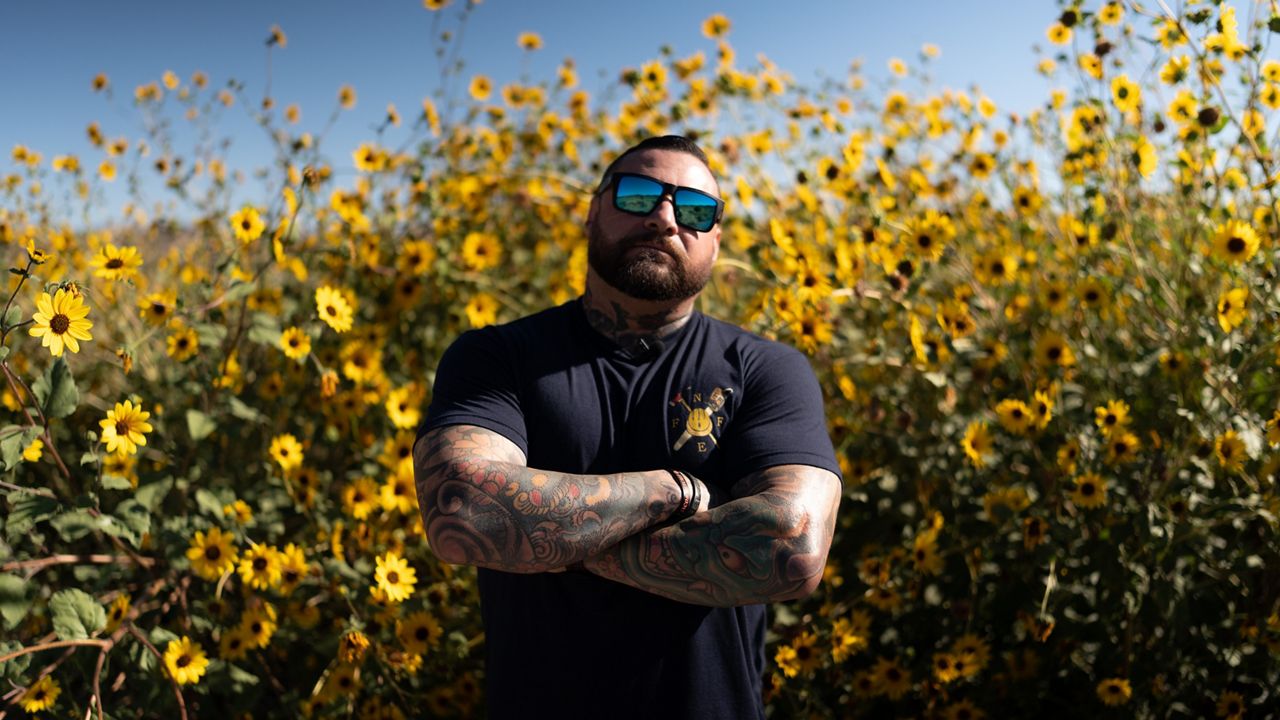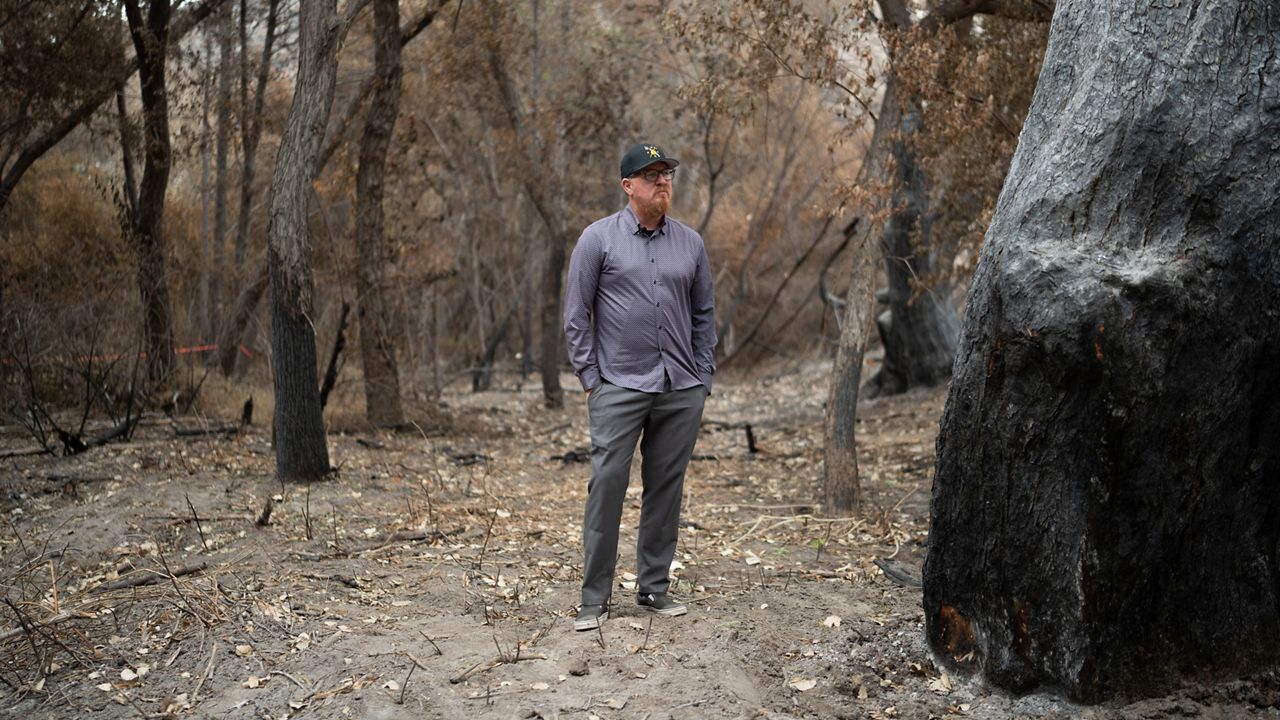LOS ANGELES — In 2021, the Bipartisan Infrastructure Law raised wildland firefighter pay by the lesser of $20,000 or 50%, depending on location.
According to the U.S. Forest Service, funding for that raise is running out at the end of September, threatening an end to the pay hike that wildland firefighters have come to depend on.
The union representing wildland firefighters, the National Federation of Federal Employees, or NFFE, warns that if Congress does not make the pay raise permanent, thousands will quit their jobs, undermining the Forest Service’s ability to manage wildfires.
Michael Alba spent much of his youth watching his father work for the Los Angeles Fire Department.
“I was raised in a firehouse,” Alba said.
Alba has since followed in his father’s footsteps, now working as a Fire Engine Operator for the U.S. Forest Service.
His work often takes him away from his Southern California home for weeks. Since early September, Alba has been at Six Rivers National Forest near the California-Oregon border working to contain a fire that has already burned more than 90,000 acres.
On his missions, Alba inhales carcinogenic smoke, dodges walls of fire traveling faster than he can sprint and sleeps in “the black” — a layer of ash and soot from recent flames. The physical demands of the job are intense, but Alba says the real challenge is financial.
Like many other wildland firefighters, Alba has lived paycheck to paycheck for most of his time with the Forest Service. The wildland firefighter pay raise in 2021 helped him pay his bills, but as funding for that pay hike runs out, he is beginning to worry about his ability to support his family.
“Taking that kind of pay cut would hurt me dramatically. I’ve got kids, I have to provide for my family,” Alba said.

And he is not the only one concerned. Alba says coworkers at his station have already begun to quit and join more lucrative fire departments because they anticipate dramatic pay cuts.
“I already lost a driver and a firefighter to other agencies, Cal Fire and LA County. We can’t keep up with other municipalities because they just pay more. We take a lot of pride in being wildland firefighters, in wearing green pants, but at the end of the day, you have to do what’s best for your family,” Alba said.
According to the union, if pay is reduced back to as low as $15 per hour, up to half of the over 11,300 wildland firefighters in the country may quit their jobs.
To avoid a mass exodus of personnel, NFFE members have been traveling across the country and meeting with elected officials like Representative Josh Harder to advocate for making their pay raise permanent.
In early August, Rep. Harder cosponsored a bipartisan bill doing just that. But though the Wildland Firefighter Paycheck Protection Act has wide support across the political spectrum, Rep. Harder says the bill has been hamstrung by his most conservative colleagues.
“It defies common sense. I had an amendment to fix it and it got voted down in committee by folks on the far-right who somehow thought cutting firefighter pay was going to save money in the long-term. It is exactly the opposite. If we cut this firefighter pay, we lose 5,000 firefighters from our federal workforce and these fires continue to get worse,” Rep. Harder said.
The Wildland Firefighter Paycheck Protection Act has yet to receive a floor vote and with less than two weeks before funding runs dry, Rep. Harder says he is fighting hard to get the bill moving as soon as possible and continuing to meet with union organizers like Max Alonzo.
Alonzo was a wildland firefighter for years, but after getting injured on the job, he could no longer continue his duties on the frontlines. He has since dedicated much of his time to advocating on behalf of wildland firefighters and he says a loss of personnel would devastate the U.S. Forest Service’s ability to fight fires.

“If we don’t have people that are qualified to stop these fires and handle this, we’re going to lose lives, we’re going to lose cities, we’re going to lose towns, we’re going to lose communities,” Alonzo said.
According to Alonzo, though the U.S. Forest Service may occasionally be able to recruit new firefighters, retention after training has become an increasingly difficult challenge.
As income disparities between agencies grow, many decide to move to city, county or state agencies where pay is significantly higher. And as staffing challenges continue, wildfires become more difficult to manage.
That is made all the more dangerous by the climate crisis. Research from the Federation of American Scientists shows that the average annual area of land burned by wildfires has more than doubled since the 1990s. Wildfire intensity, severity, size and duration have all increased in part due to changes in our climate, according to NASA. And data from the National Interagency Fire Center shows that federal firefighting suppression costs have more than quadrupled since the 1980s.
But the danger of cutting wildland firefighter pay is not limited to its environmental impact. For those who decide to remain with the U.S. Forest Service, increased financial pressure will add stress to a population already struggling with their mental health.
A 2021 study found wildland firefighters reported symptoms consistent with depression and generalized anxiety at about two to three times the rate of general populations. And according to a 2018 study, more than half of wildland firefighters reported suicidal thoughts — almost triple the figure for the general population.
“Suicide is a really, really big issue in wildland fire,” Alonzo said. “The amount of stress you’re under, you don’t walk away from it. You’re out there sometimes for 14 to 21 days, sleeping in the black with no cell service, getting almost zero sleep, working 16-hour days, getting eaten alive by bugs, waking up without a shower day after day after day. And when you get home at the end of season, life has moved on without you. That’s when it usually happens.”
According to Alba, he has seen wildland firefighting’s impact on mental health firsthand.
“I’ve known a lot of folks, not only throughout my career, but at my own station, pass due to mental illness. It hits home, not only with my own folks, but with myself,” Alba said.
As time ticks down to the impending pay-cliff, Alba is holding out hope that Congress will act and provide wildland firefighters with the support he says they desperately need.
“I plan on wearing green pants until the day I die. I believe in this Forest Service, I believe in this agency, and I hope, I hope, I hope, I hope they believe in us,” Alba said.
Alba bleeds green, an expression of pride and dedication among wildland firefighters. As he continues putting his life on the line battling wildfires, he also plans to keep fighting for what he says is a fair and living wage.



